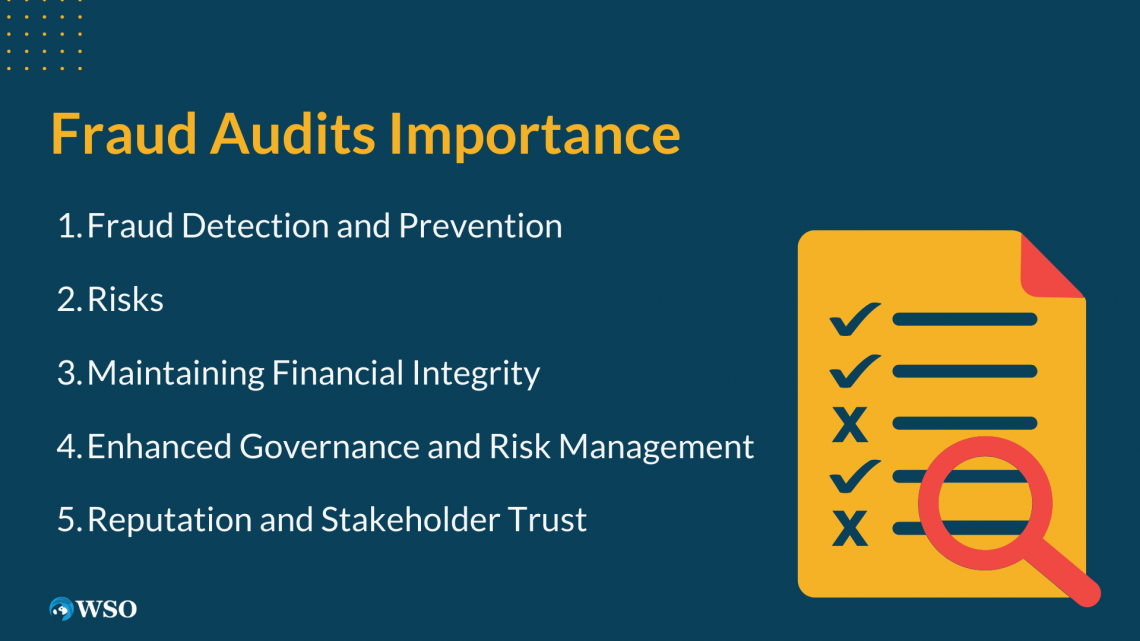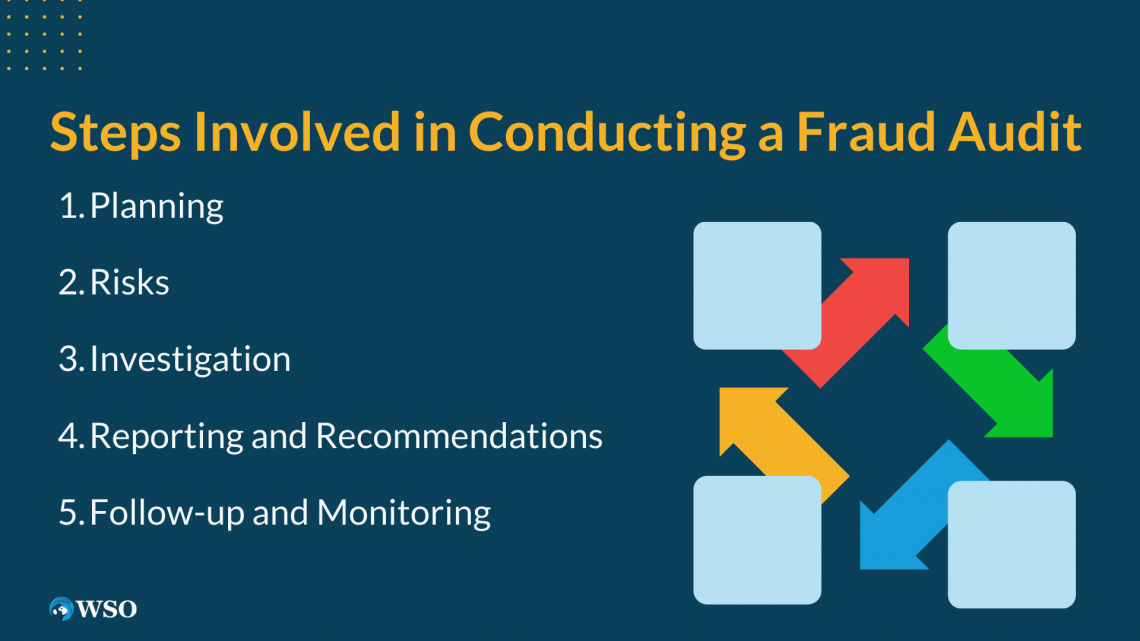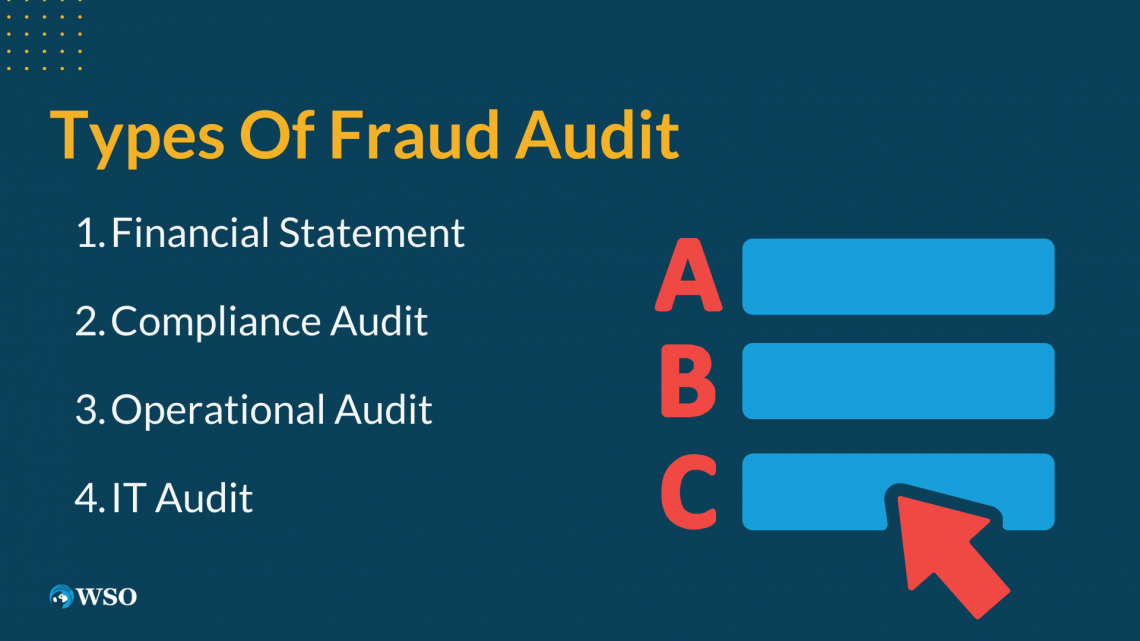Fraud in Audits
It is a specialized examination of an organization to detect and prevent fraudulent activities.
A fraud audit is a specialized examination of an organization to detect and prevent fraudulent activities. A basic example of fraud would be discovering that an institution has been deliberately misconstruing financial statements.

Organizations engage in fraud when they manipulate their financial health either by purposefully overestimating gains or underestimating costs and losses. This is dangerous because it falsely advertises its companies to the public and stakeholders who otherwise would not have invested.
Falsifying financial statements is illegal and can be embezzlement or asset misappropriation; since financial statements are the backbone of communication between a company and investors, the deterioration of these statements is severely punished.
The scope of a fraud audit typically extends beyond the traditional financial statement audit. While financial audits focus on providing reasonable assurance about the accuracy of financial statements, fraud audits specifically target the detection of fraudulent activity.
Like other audits, this audit involves a comprehensive review of financial records. It also takes a deeper dive into internal control and operational processes to identify irregularities.

The primary purpose of a fraud audit is to evaluate the effectiveness of an institution's anti-fraud measures. But it can also identify vulnerabilities and provide recommendations to strengthen internal controls. These, in turn, help prevent future occurrences of fraud.
Auditing is critical to an organization's governance, risk management, and compliance efforts. When working in fraud, an auditor must detect material misstatements. Further investigation will reveal whether the mishap was caused by fraud or error.
Key Takeaways
- A fraud audit is a highly comprehensive audit to detect fraud.
- Fraud in audit is when a company makes misconstrued financial statements.
- Fraud in audit represents a significant risk to businesses, governments, and nonprofit organizations.
- Fraud audits are more in-depth and detailed audits than financial audits.
- Any corruption of financial statements paints a false image to the public and is highly illegal.
- Fraud audits must be done by a licensed professional who is CFE certified. This can take the shape of forensic or expert auditors specializing in fraud.
- Three elements responsible for the fraud have coined the term “fraud triangle.” These consist of rationalization, pressure, and opportunity.
Understanding Fraud Audit
A fraud audit systematically examines a company’s financial information to find proof of fraud. It involves thoroughly investigating the organization's systems, transactions, and controls to identify the risk of fraud.

The procedure of a routine audit differs from this type of audit. To perform an audit for fraud, the auditor must do a very detailed investigation regarding even small sums of money to gather evidence that fraud has occurred.
Multiple employee interviews are conducted to test the involvement of the employees regarding fraud. The interviews must be intensive and thorough to ensure that the origin of the fraud is found.
This audit requires specialized auditors with expertise in forensic accounting and fraud examination techniques. Specialized auditors are needed because they are knowledgeable enough to apply various investigative procedures to gather evidence and analyze financial transactions.
These auditors are often Certified Fraud Examiners (CFEs) or have undergone specialized fraud detection and prevention training. These are obtained after gaining your degree from a university and undergoing at least two years of experience in the workforce.

You can be a fraud investigator in various contexts, such as:
- Financial Frauds
- Corporate Frauds
- Insurance Frauds
In all scenarios, the goal is to uncover evidence of any fraud and account what they have found to the proper authorities.
The auditor must be certified and an expert in their field because fraudsters will often use sophisticated techniques to conceal their activities, making fraud detection challenging.
These auditors must stay updated on the latest schemes, technologies, and concealment methods to identify fraudulent transactions correctly.
NOTE
These audits are much more delicate than normal audits since they strictly operate within legal and ethical frameworks. All evidence must be gathered ethically and within the boundaries of the law. Balancing finding evidence with individuals' privacy rights and confidentiality makes the investigation challenging.
Fraud Audits Importance
There are several reasons why fraud audits are essential. They all have to do with their significant role in protecting the public and addressing the risks associated with fraudulent activities.

Here are key reasons why fraud audits are important:
1. Fraud Detection and Prevention
By examining financial records, transactions, and internal controls, auditors can uncover fraud that may go unnoticed. Early detection allows the authorities and investors to take prompt action, minimizing their financial losses and reputational damage.
2. Risks
These audits can also be helpful to companies by identifying areas vulnerable to fraud and offering advice on the effectiveness of any existing anti-fraud controls.
By helping companies understand the fraud risks they might face, organizations can implement targeted preventive measures to mitigate them. Effective fraud prevention measures reduce the likelihood of fraud and deter potential fraudsters.
3. Maintaining Financial Integrity
Fraud can distort financial statements, mislead stakeholders, and undermine the integrity of financial reporting.
NOTE
Audits help ensure the accuracy and reliability of financial information by identifying any manipulation of financial data.
4. Enhanced Governance and Risk Management
Fraud audits contribute to an organization's governance and risk management frameworks. They provide valuable insights into the effectiveness of internal controls, risk management processes, and corporate governance practices.
Fraud audits strengthen the organization's risk management capabilities by identifying control weaknesses and recommending improvements.
5. Reputation and Stakeholder Trust
Fraud severely damages an organization's reputation and erodes stakeholder trust for good reason. A fraud audit can help uncover the company's commitment to transparency and accountability.
If fraud is not uncovered after a thorough investigation, this can gain back stakeholder confidence, attract investors, and preserve the organization's reputation in the market.
How Do Fraud Audits Take Place?
An audit requires a systematic approach to assess the risk and adequately detect fraud.

These are the steps involved in conducting a fraud audit:
1. Planning
- Understand the Organization: Gain a thorough understanding of the organization's business operations and industry. This makes it easier to identify the fraud risks specific to the institution’s activities and industry.
- Objectives: Before any audit, the auditor will typically define the goals and scope of the audit. They do this by considering areas of higher fraud risk, regulatory requirements, and management concerns.
- Develop an Audit Plan: Create a detailed audit plan outlining the procedures.
2. Risks
- Identify Risks: Identify the specific fraud risk factors applicable to the organization.
- Fraud Vulnerabilities: Evaluate the organization's internal controls, policies, and procedures to identify vulnerabilities that can be used to cover up fraud.
- Prioritize Fraud Risks: Prioritize the identified fraud to gather evidence of its occurrence.
3. Investigation
- Data Analysis: Utilize data analysis techniques to identify anomalies, unusual patterns, or red flags in financial and non-financial data. This may involve analyzing transactional data, comparing benchmarks, or conducting trend analysis.
- Forensic Accounting Techniques: Apply forensic accounting techniques to examine evidence in detail. Examples are tracing funds, identifying fictitious vendors, and analyzing complex transactions.
- Interviews and Interrogations : Conduct interviews with relevant employees to gather insights and evidence of the accused fraud. Effective communication and interview skills are crucial in this step.
- Documentation Reviews: Review organizational policies, procedures, and documentation to assess compliance with regulatory requirements.
4. Reporting and Recommendations
- Document Findings: Prepare a comprehensive report outlining the fraud audit findings.
- Provide Recommendations: Offer specific recommendations for strengthening internal controls, improving processes, and preventing future occurrences of fraud.
- Communicate Findings: Present the findings and recommendations to relevant stakeholders, including management, the board of directors, and the audit committee. Discuss the next actions required.
5. Follow-up and Monitoring
Collaborate with the management to implement recommended control and process improvements. Provide guidance and support during this phase.
NOTE
It is important to reiterate that fraud audits require specialized skills and expertise. Only certified fraud examiners (CFEs), forensic accountants, or experienced auditors with specific fraud investigation training can conduct these audits effectively.
Auditors must adhere to professional standards throughout the audit process to ensure the ethical and legal gathering of evidence.
Types Of Fraud Audit
Fraud audits can be divided into two broad categories: falsification and misappropriation. However, there are more detailed sectors of fraud that an organization can take part in and specific audits for them.

Here are some common types of fraud audits:
1. Financial Statement
Misconstrued financial statements are the most common type of fraud. Its main focus is on evaluating the reliability of an organization's financial statements to detect any fraudulent reporting.
It involves a detailed examination of financial transactions and accounting records to identify potential misstatements and manipulation of figures.
2. Compliance Audit
A compliance audit tests how a company adheres to laws and regulations. It aims to identify any instances of non-compliance.
The audit examines whether the organization has established effective controls that comply with legal and regulatory requirements.
3. Operational Audit
Operational audits focus on evaluating the effectiveness of internal controls and processes within various operational areas of an organization. It aims to find any areas and control weaknesses that could be exploited for fraud.
4. IT Audit
An IT audit examines a company’s information technology systems to identify any technology-related fraud activities.
Notably, the specific types of fraud audits an organization conducts may vary depending on its industry and size.
NOTE
Companies can also combine these audits based on their unique circumstances to address their specific fraud prevention and detection needs.
Summary
Overall, fraud audits are just a specialized examination to prevent fraudulent activities within an organization. Qualified professionals always conduct them to detect and prevent them effectively.

This type of audit usually involves a detailed review of financial records to identify if there has been any fraud. Reviewing internal controls and operational processes is also important to identify any irregularities.
One of the main goals for implementing such an audit is to test how effective an organization's anti-fraud measures are—these help in identifying vulnerabilities to reveal and prevent occurrences of fraud.
NOTE
Fraud audits go beyond traditional financial audits and are much more detailed. They can target the detection and prevention of fraudulent activities through techniques such as data analysis, forensic accounting, interviews, and process reviews.
The audit process is typically longer than usual and requires close collaboration and cooperation between auditors, management, legal teams, and other stakeholders. The main objective of an audit is to establish an environment of trust for the general public and company members.
Since they are a very complex type of audit, only specific individuals can conduct them, such as forensic auditors, auditors specializing in fraud, and auditors with their CFE.
Proactively detecting and preventing fraud contributes to how organizations can protect their reputation and maintain the integrity of financial reporting for everyone involved.




or Want to Sign up with your social account?